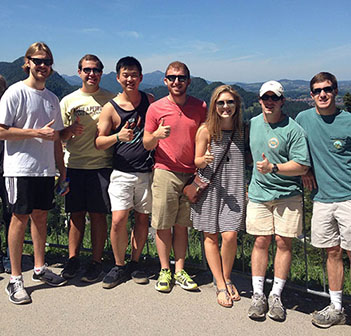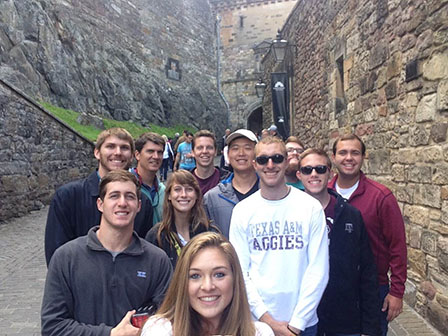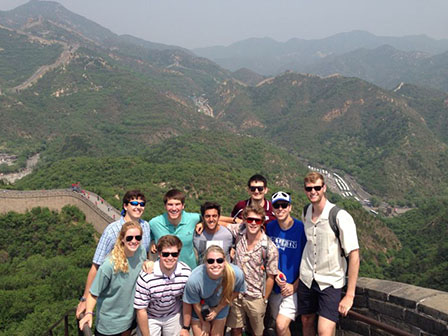Because the petroleum industry is international in scope and serves a worldwide need for energy, it is vital to expose students in the Harold Vance Department of Petroleum Engineering at Texas A&M University to other cultures. One way is through Texas A&M sponsored study abroad programs led by department faculty and designed around specific petroleum courses. In the past three years this has included trips to China (2014 and 2015), Brazil (2013 and 2014), and Germany (2015).
The study abroad programs at Texas A&M are usually geared to either two or three week courses after spring semesters or during winter breaks, or more lengthy summer term sessions. Since the courses are instructed by Texas A&M faculty, the hours taken are not transferred but directly credited. The Department of Petroleum Engineering requires its students to work a six-week summer internship prior to graduation, so great care is taken to offer study abroad courses at times that do not interfere with this requirement.

Dr. Eduardo Gildin led the first petroleum engineering study abroad program in Brazil during the second summer session of 2013. It was a joint effort including other faculty from the mechanical, electrical, and chemical engineering departments within the Dwight Look College of Engineering. All course material was identical to on-campus instruction but a bit more challenging to learn due to experiencing another country at the same time. The Catholic University in Rio de Janeiro provided accommodations and the students had the opportunity to augment classroom time with field trips to subsea equipment and electrical grid industries. Long weekends were devoted to visiting cultural attractions in Rio. Students visited the city of Ouro Preto, known for its gold, gems and mining, and the historical city of Petropolis, which is known as The Imperial City and served as the summer residence of the Brazilian emperors and aristocrats in the 19th century.
Gildin also led a study abroad trip in 2014, which visited Recife, Brazil. Dr. Sam Noynaert from petroleum engineering and Dr. Ulisses Braga Neto from electrical engineering joined him. Classes were hosted by the State University of Pernambuco (UPE). Like the first program, the students were afforded both classroom instruction and field trips. They managed to visit the largest refinery in Brazil, which was under construction at that time, and CHESF, the central electrical power generation company. The students also experienced the various cultural influences in Brazil such as the city of Olinda (UNESCO World Heritage site), street food and markets, tapioca made to order, churrascarias, and the nightlife. They visited the world-famous Baia do Sancho beach in Fernando de Noronha and dove with sea turtles and dolphins.
“Brazil is a very large and diverse country, and I was glad to have students visiting my home country and learning a little bit about the history of Brazil, its cultural influences and the great potential of the industry, especially related to the petroleum and energy sector,” said Gildin.
The most recent trip, to Germany in the summer of 2015, was entirely a petroleum venture taught by Gildin and Noynaert, who divided the instruction times and locations. In order to save the students money and get the program off to a good start academically, the first week of the semester was held at Texas A&M. This allowed the students time to adjust to the material, the pace of the courses, the instructors and each other without the additional stress of travel. In addition, faculty members were able to front load the teaching schedule, allowing the students Fridays off while abroad to pursue cultural and sight-seeing amenities. The next four weeks were completed at Clausthal Technical University, a small public institution located in Clausthal-Zellerfeld, Lower Saxony, Germany in the Harz mountain region. The university has a highly regarded petroleum engineering program for graduate studies and the Aggies were treated to views of the world-class oilfield tubular testing facility and other labs there. They also benefitted from interactions with Dr. Gioia Falcone, head of the petroleum engineering department at Clausthal; one of her faculty members, Dr. Javier Holzmann; and the very kind Clausthal staff.

The students walked by history every day and learned more about Germany with every step. The Harz region essentially paid for much of the Holy Roman and Saxon empires’ operations through hundreds of years of silver mining. Martin Luther was born and died in the Harz, the Brothers Grimm created their fairy tales based on the area, and much of Goethe’s Faust was set in these mountains. The mines are now closed and forestry restricted, making tourism the prime industry, yet the region is not known for speaking English. With help from members of the TU Clausthal Society of Petroleum Engineers student chapter, the Aggies quickly adapted to the language, food and customs. They even ventured out to visit Amsterdam, Prague, Hamburg, Munich, Berlin, Stuttgart, Nuremberg and Austria. The students also traveled to Scotland for one weekend where a tour of the Core Lab in Aberdeen introduced the students to a wide variety of lab equipment used to analyze cores and reservoir fluids. They were also able to see the geological, reservoir and operational planning processes for an upcoming high complexity geosteered well at the BP offices, and used a live feed to an offshore installation to ask the personnel question about rig operations.
“In spite of the challenging academic component of the program, the students for both programs (Germany 2015 and Brazil 2014), found plenty of time for fun outside the classroom,” said Noynaert. “Whether it was interacting with the local students or spending weekends traveling through Europe together, they were able to form new friendships, experience things they never had before and make many wonderful memories.”
Unlike Brazil and Germany, the trip to China in 2014 involved a two-week time frame known as a Maymester. The course, PETE 325-Petroleum Production Systems, was held in China just after spring semester classes ended in May. Dr. Ding Zhu, Dr. Rashid Hasan, and Dr. Jiajing Lin, a former professor in the department, taught the course, which gave students an introduction to production operations and oil field equipment using facilities available in the China University of Petroleum, Beijing. The course was taught over a period of nine days with three hours of lecture each day. Tests were arranged at the end of the first week and at the end of the course. The host university featured a modern production teaching lab where the students were able to perform the lab-required sections of the course. Students were then taken on a field trip to Dagang Oilfield to see related facilities, production operations and equipment.
“The value of taking study abroad courses is not measurable by the courses themselves,” said Zhu. “The students have the opportunity to see the world, to know the applications of the technology internationally – that is more important for petroleum engineers than most other industries. That is so much more beneficial to their future career.”

The students were also given the opportunity to visit three places in the Beijing area: the Great Wall, the Forbidden City, and the Olympic Village. While staying in housing at the university, the Texas A&M students had the opportunity for cross-cultural exchanges and made new friendships when several Chinese students attended the class.
“Most of our students have spent much of their lives in small towns,” said Hasan. “For them to visit a major city in a far-away land, speaking with the locals using a few words half-learned, hugely aided by sign language, is a priceless learning experience. One might consider teaching and learning under such circumstances to be less than optimal, yet my personal experience is that the demanding situation makes the students become very focused and active learners.”
Encouraged by the previous successes of the petroleum engineering abroad courses, Gildin will lead a three-week Maymester program in Aberdeen, Scotland in 2016. Aberdeen, a historically rooted city with modern and international elements, is called the oil capital of Europe. Holding class there offers students the opportunity to visit several giants in the oil business while allowing them the chance to explore many popular cities in the United Kingdom and possibly Europe.
Zhu, Noynaert, and Hasan are also planning to teach future study abroad courses, recognizing how critical it is for petroleum engineering students to experience the world.
“Petroleum is a commodity produced by countries that are as diverse as can be, and is needed by people all over the world,” said Hasan. “Experiencing even a fraction of that diversity gives our students not just a leg up in their career, but allows them to appreciate and enjoy more of what this profession has to offer.”
For more information on the study abroad programs, please visit the Study Abroad Programs Office at http://studyabroad.tamu.edu.